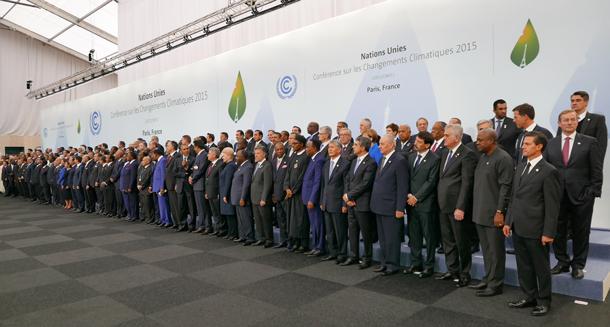The next UN Climate Change Summit aims to push the world to do more and do it faster
At the 2015 United Nations Climate Change Conference in Paris, heads of government and states from 185 countries reached an agreement on how to combat climate change. Now, countries under the Paris accords are beginning to hint at plans to ramp up their pledges ahead of schedule.
The United Nations is gearing up for a climate summit in New York in September, and already a number of nations have hinted they plan to boost the “intended nationally determined commitments,” or INDCs, they first made under 2015 landmark Paris climate agreement.
Nearly every country in the world is currently a signatory to the agreement and the hope is there will be enough action to keep the planet from warming more than 1.5 degrees Celsius. That’s a tough goal, considering Earth is already about 1.1 degrees warmer than pre-industrial levels. Still, more than 190 nations are expected to pledge more ambitious goals, even as United States President Donald Trump says he wants to take the US out of the Paris deal as soon as withdrawal becomes possible in November 2020.
Related: Is climate change causing us to experience ecological grief?
Luis Alfonso de Alba, the United Nations secretary general’s special envoy on climate change, says these pledges are only one reason the September UN Climate Change Summit is important. “[T]he Paris agreement has gathered the support of the international community and it has an ambitious agenda, but the process of implementation needs to be sped up and scaled up,” de Alba says. “Today we know that we need to do much more and much faster.”
Current INDCs from the signatories to the Paris agreement amount to only one-third of what is needed to reduce emissions by 45% by 2030 and to reach carbon neutrality by 2050, de Alba says. Because the majority of carbon emissions are “very much concentrated in a small number of countries,” one of the objectives of the summit is to target these major emitters and push for deeper cuts, de Alba says.
Related: Scientists say 25 years left to fight climate change
Despite the Trump administration’s decision to exit the agreement, de Alba believes the US overall is doing a lot to fight climate change. “You can see that in a number of areas and a number of commitments by the business sector [and] by local authorities in different parts of the States,” he says. “That contribution will continue to grow, and it’s quite important because the level of emissions in the US is one of the biggest.”
De Alba believes most countries will increase their commitments but adds that “we [also] need a very substantial increment in the [overall] ambition. We are looking not only at increasing the political will and the commitment of member states but also to identify the areas in which innovation, in which scaling up a number of initiatives, could also help us speed up the process.”
A successful summit, de Alba says, will result in “a process that will be constant, continuous — that will allow transitions, but at the same time will be constant — and will include an increased number of sectors and areas in which we are working,” de Alba says. “I think success will be [achieved when] governments understand that this is an issue that affects the economy as a whole and not only the environmental agenda.”
This article is based on an interview that aired on PRI’s Living on Earth with Steve Curwood.
Our coverage reaches millions each week, but only a small fraction of listeners contribute to sustain our program. We still need 224 more people to donate $100 or $10/monthly to unlock our $67,000 match. Will you help us get there today?
